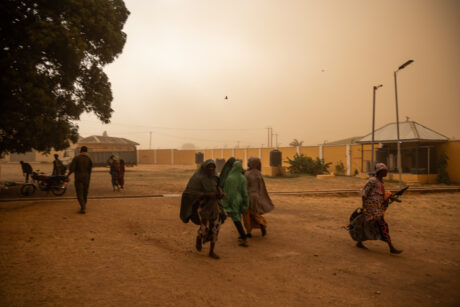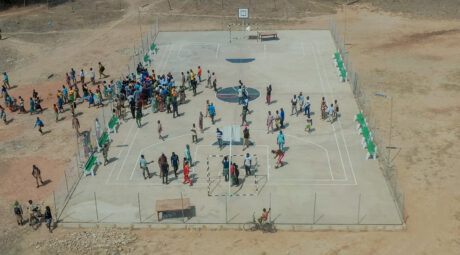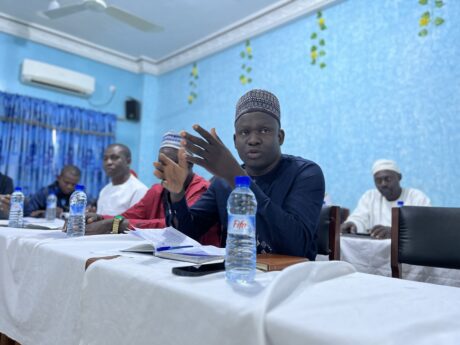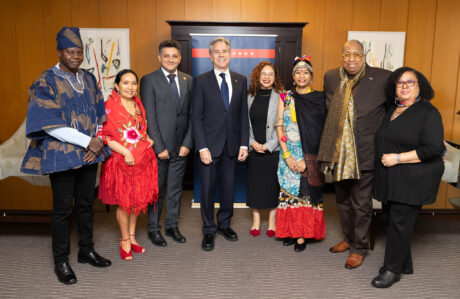Economic growth, peace, youth and climate change are among the eight topics to be addressed during theCumbre de líderes entre Estados Unidos y África. In anticipation of the Summit (Dic. 13 a 15, 2022) en washington, CORRIENTE CONTINUA., Creative gathered comments from its implementing partners, grantees and others in Africa about a few of these issues. The answers have been edited for length and clarity. They do not reflect the opinions of Creative or its clients.
What investments can U.S. and African leaders make to increase or enhance the contribution of youth to peace, security and good governance?
Kassim Fomba, Director of Think Peace in Mali, whose organization is a partner and consortium member of the of the USAID-funded Construcción de paz, Estabilización y Reconciliación programa. Think Peace is a Malian organization that focuses on peace, seguridad, reconciliation, governance and the fight against violent extremism at the local, regional and national levels. It specifically works to improve peace and governance in Mali through youth engagement.
Respuesta: Malí, like several countries in the Sahel, faces multiple crises. We need to ensure collaboration that will contribute to the strengthening of institutions for better governance. Diplomacy must be part of promoting the free movement of people and goods and the creation of conditions conducive to Africa’s successful participation in the global market. There are a few investments that U.S. and African leaders should make that would enhance youth engagement:
Increase youth inclusion in decision-making bodies with the goal of increased participation in development activities. In communities, youth are excluded from the management and benefits of public resources. This leads to a rural exodus, a loss of labor, banditry and more.
Support African governments’ efforts to strengthen and enforce legal frameworks governing the exploitation of natural resources. In Mali, populations residing in the geographical areas of these natural resource sites often benefit least. De lo contrario, they suffer consequences including armed insurgency, rural exodus and poverty.
Develop vocational training and business creation strategies that facilitate young entrepreneurs’ access to financing. Youth who are seeking funds for their startups cannot access traditional banking services.
Finalmente, doreate jobs through the industrialization of African countries, including the establishment of raw materials processing units.
Why is it important to work with women in peace and security?
Rakiatou Tchassama Salifou, Presidente, Centre de Recherche et d’Appui pour le Développement Local (CRADEL), Benín
Respuesta: In Benin and many parts of West Africa, our mothers would put three stones together, place a pot on these stones and cook. With only two stones, the pot would be unstable, and all the food would eventually spill over. In building peace and social cohesion, women represent the third stone – often overlooked but essential to the stability of their community.
In our context in the north and especially along the border, women are the first to notice strange behavior and the presence of unknown faces; they pick up and share a lot of information while trading and going about their daily activities. This information may not seem relevant at first but may be of significance to the security forces and community leaders.
That’s why in our engagements with women, we train them about early warning and reporting; we encourage them to speak up and explain to them that they are the ‘third stone’ of their community and should therefore be ambassadors for peace – and it’s working!
Africa has its share of conflict, including violent extremists and farmer-herder conflicts. As a peacebuilder, what is peace?
Father Thaddeus, Executive Chair, Northern Peace Council, tamal, Ghana, whose organization is a grantee of the USAID/OTI-supported Iniciativa Regional de Litorales.
Respuesta: I always say that peace is when people are living nonviolently and with respectful attention to the legitimate needs of others or one another. My major measure of peace is nonviolent relationships. And that is why I’m very disheartened to say that we are still not there. Because if you look at nonviolence, it’s not just about physical. You can suppress physical violence, but psychological violence is very pervasive. How can we minimize this?
Frequently in my interventions, I’m trying to help people to relate with each other with great attention to the fact that in our relationships we are not violating each other either physically, psychologically, culturally or even structurally. So my answer if you ask the question “what will be my measure of future for peace” is when I see our communities living together, cohesively, nonviolently, with respect to one another and respecting our differences. For me that is my measure for peace. But some people will tell me it’s very difficult to measure that.
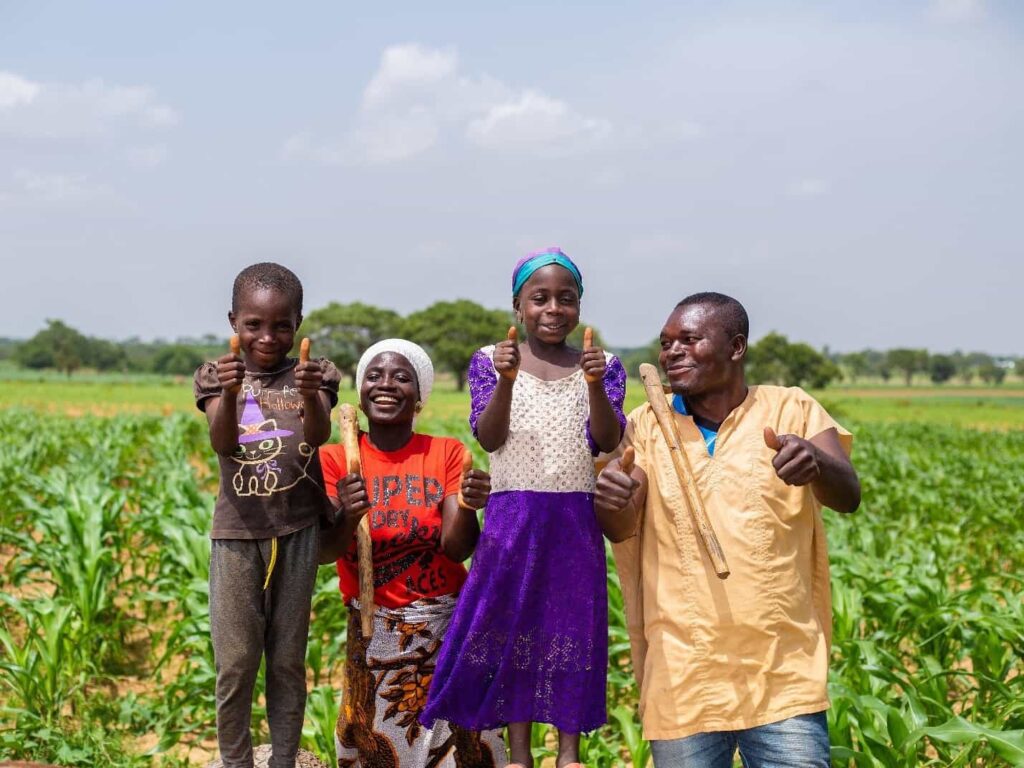
How does working in a conflict area affect your operations, and how have you navigated through this challenge?
Mira Mehta, Fundador & director ejecutivo, Tomato Jos in Nigeria, whose company is a grantee of the USAID-funded Comercio de África Occidental & Centro de inversión.
Respuesta: The security situation within Nigeria in general, and Kaduna State specifically, has deteriorated significantly since 2019. Kidnappings for ransom have been on the rise, and large groups of bandits have taken control of many rural areas, including forests in and around the Kangimi Dam where Tomato Jos and its partner farmers are located. Tomato Jos has had to increase its security significantly. En segundo lugar, we have restricted our operations to our allocated land which enjoys this security. With the help of all our security, we ensure that no farmer stays on the farm beyond 5:30 p.m.
Last and most importantly, participación comunitaria. Our smallholder program engages more than 1,000 farmers who usually have more than seven other persons working for them each. The tomato factory and other operations also employ more than 4,000 people from the surrounding communities. And many other small businesses have opened up as a result of this project. These opportunities have engaged the vast majority of people in the community and we believe these have significant impacts on the security we enjoy. Since the whole Tomato Jos farm is cultivated by smallholder farmers, the whole surrounding communities are stakeholders in the project and have therefore shown commitment to ensuring the farm is secured. By engaging the community and making them have a stake in this project, community members are our very first layer of security.
How does your business model incorporate climate-smart mitigation and adaptation strategies to improve productivity and performance?
Christopher Zaw, director ejecutivo & Pareja, Warc Ghana, whose organization is a grantee of the Comercio de USAID en África Occidental & Centro de inversión.
Respuesta: Warc’s mission has two pillars: Getting subsistence farmers out of poverty; and helping them become climate heroes. Given that Warc’s farmers are based in the Upper West of Ghana in the Sahel region, where climate change can critically impact farmers’ producción, we are key supporters of ensuring agriculture becomes climate smart, as fast as possible.
Warc is a major promoter of no-till agriculture and regenerative agricultural practices. Since our inception, we have been converting farming land in West Africa from traditional and conventional agriculture to low- and no-till practices. Our focus has always been on soil management and protecting humanity’s greatest resource – its soil.
We also encourage farmers to engage in crop rotation – a key element of fighting disease and pests, as well as conserving natural biodiversity of soils. We promote maize and soybean crop rotation for farmers, to allow soybean, a legume that fixes nitrogen in the soil, allowing the following maize crop to benefit and reducing farmers’ reliance on additional chemical fertilizers.
The benefits for this change occur over time. Al final, we’re referring to an entirely new system of agriculture.
How does your business model incorporate climate-smart mitigation and adaptation strategies to improve productivity and performance?
Sjoerd Melsert, Senior Investment Manager, Cordaid Investment Management B.V., which partners with the Comercio de USAID en África Occidental & Centro de inversión.
Respuesta: Cordaid Investment Management invests in fragile states like Mali and Burkina Faso, where armed groups threaten peace and security in the region and draw in local youth. With the devastating numbers of youth unemployment, many see no alternative. We want to give that chance to vulnerable populations. With USAID’s support, we invest in small- and medium-sized enterprises that create jobs and economic opportunities for women and youth.
Por ejemplo, one of our investees in Mali Access SA, a mini-grid developer, is providing clean energy access to rural areas that in many cases have only 2 percent electrification rate. We helped finance the project that supported 745 microentrepreneurs and created 240 direct jobs during construction. The company hires and trains young engineers, many of whom are women. Además, solar power enabled rural communities to engage in small businesses, like becoming a tailor or opening a small café. Investments like this create an impact on many levels that, Sucesivamente, support peace, security and good governance in the Sahel.
